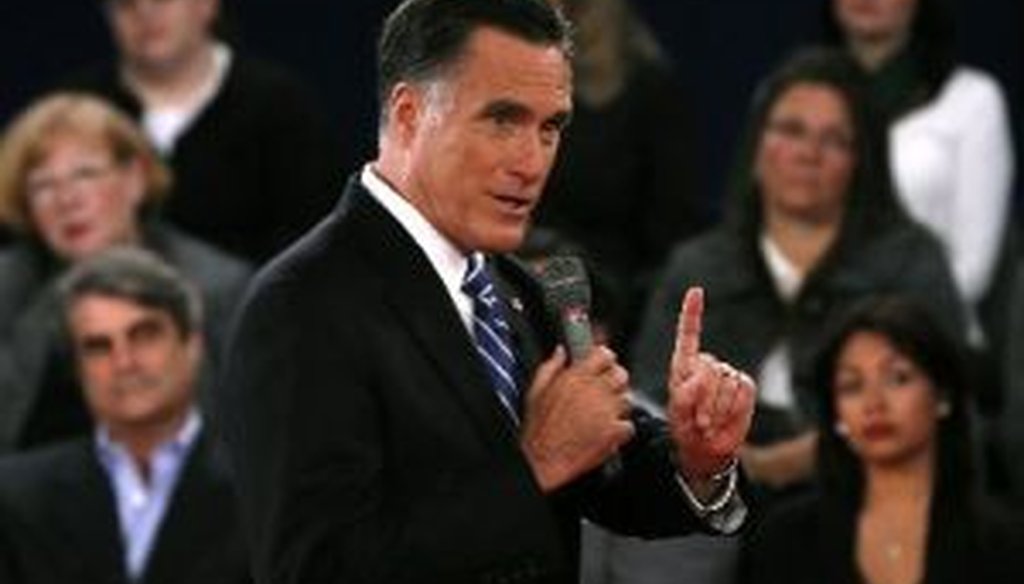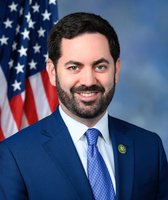Stand up for the facts!
Our only agenda is to publish the truth so you can be an informed participant in democracy.
We need your help.
I would like to contribute

Mitt Romney squared off with President Barack Obama at Hofstra University in the second presidential debate of 2012.
Mitt Romney says 'oil production is down 14 percent this year on federal land'
President Barack Obama and Mitt Romney sparred during the second presidential debate over drilling policy on federal lands.
Romney said -- among other things -- that "oil production is down 14 percent this year on federal land."
That’s similar to a statement that PolitiFact Ohio checked last April-- "Last year, we produced 14 percent less oil on public lands than we did the year before." It’s also similar to a claim we checked a few weeks later, that oil "production's down where Obama's in charge."
We’ll recap our analysis here.
The 14 percent number
We turned to a report from the U.S. Energy Information Administration titled, "Sales of Fossil Fuels Produced from Federal and Indian Lands, FY 2003 through FY 2011." To produce the report, EIA worked with the Interior Department’s Office of Natural Resources Revenue, which tracks royalties to the government for oil, gas and coal produced on federal lands, including oil from offshore wells.
While Romney said "this year," the most recent data available is from 2011, so that's what we'll use. In 2010, EIA data show, 726 million barrels of oil came from federal lands, including offshore wells. In 2011, it was 626. That’s a drop of 13.77 percent, which can be rounded to 14 percent.
This data, as well as a more complex measure (it involves royalties and British thermal units of energy, but we’ll spare you), would appear to render the statement accurate.
How reliable is it?
But is the 14 percent figure cherry picked?
Yes, says Jay Hakes, who directed the independent U.S. Energy Information Administration for seven years during the Clinton administration. "From a statistical standpoint, to take one year out of three — one year is not indicative of a trend," he said.
So we pulled the numbers from when George W. Bush was in office -- January 2001 to January 2009 -- as well as from when Obama was in office. In our chart, we’ve italicized the years he was in office and put in bold the years Obama led.
We note that:
• From 2004-08, well into Bush’s tenure, oil production on federal lands and waters fell in four of five years, for a net decrease of 16.8 percent.
• From 2009-11, the Obama years, oil production rose two of three years, for a net increase of 10.6 percent.
Featured Fact-check
It’s also worth taking a closer look at what went into the overall number.
From 2009 to 2010, oil production from offshore sources rose by 14.9 percent. Prior to that, before Obama’s presidency, the offshore volume fell for several years, and it was erratic even during a phase in which it rose, EIA figures show.
Yet onshore oil production generally rose on federally owned land -- and did again in 2011, by 3.7 percent. Offshore production that took the hit, falling 16.8 percent.
So the big story of the one-year dropoff in public production is the Deepwater Horizon oil spill of 2010. A six-month moratorium on exploratory drilling followed — though it by no means stopped gulf oil production— along with changes in regulation that forced the industry to adjust.
While the moratorium could have been more targeted, it wasn’t a policy choice unique to Obama, said Hakes, the former EIA director who also directed policy and research for the National Commission on the BP Deepwater Horizon Oil Spill and Offshore Drilling. Bush had his own disasters to contend with: Hurricanes Katrina and Rita in 2005 also drove a decline the next year, said Shirley Neff, a senior adviser at EIA. And President Richard Nixon ordered a moratorium in the wake of a 1969 well blowout off the coast of Santa Barbara, Calif.
"Every president, if you have a blowout like that … is going to get a moratorium," Hakes said.
Who gets the credit or blame?
It’s important to note that most big boosts in production, according to experts, follow years of earlier exploration and drilling -- efforts begun under the policies of prior administrations. By the same token, Obama’s actions in office should have an impact in the years to come.
"I don't think Obama can claim a lot of credit for production levels now, and I'm not even sure that Bush can," said Hakes, the author of A Declaration of Energy Independence, which looks at energy policy from President Harry S. Truman to President George W. Bush. "If you're going to go back — who should get the credit — I might be able to find something that Nixon did."
The recent expansion of hydrofracking — using pressurized fluid to get gas or oil out of rock formations — came about over decades.
"That's why attaching production things to any particular administration is a very, very tricky business, and probably best handled in books rather than in articles," Hakes said. "There are just too many factors."
So, Obama certainly shouldn’t be claiming full credit for increases in oil production on private land — but neither should supporters of Bush.
Our ruling
So: Did the United States produce 14 percent less oil on its public lands last year? Yes.
But there’s nuance in the number. Production under Obama was hobbled due to the Deepwater Horizon disaster, making a one-year figure subject to cherry-picking. And it’s not at all clear that the president in charge when the oil is taken out of the ground deserves full credit or blame; years of prior policies on exploration and drilling had an impact.
On balance, we rate the claim Half True.
Our Sources
Mitt Romney, transcript of second presidential debate, Oct. 16, 2012
PolitiFact, "Crossroads GPS ad says oil production on federal lands dropped under President Barack Obama," April 13, 2012
PolitiFact, "Rob Portman says oil production on public lands was down 14 percent in 2011," April 2, 2012
Rob Portman, radio interview with Fox News, March 26, 2012
Greenwire, "Drilling leaves federal lands because state, private acres are cheaper, says BLM chief," by Phil Taylor, March 14, 2012
Greenwire, "OIL AND GAS: Production on federal tracts fell in 2011," Feb. 27, 2012
Crossroads GPS, "Too Much," uploaded April 10, 2012 via YouTube
U.S. Department of Interior,Office of Natural Resources Revenue, statistics database, accessed March 27, 2012
White House blog, "American Energy: The Facts," March 15, 2012
U.S. Energy Information Administration, "Sales of Fossil Fuels Produced from Federal and Indian Lands, FY 2003 through FY 2011," March 2012
U.S. Energy Information Administration, "Short-Term Energy and Summer Fuels Outlook," April 10, 2012
Transcript, Bob Abbey testimony before Senate Appropriations Committee, Subcommittee on Interior, Environment and Related Agencies, March 14, 2012
National Journal,"Obama’s Fuzzy Oil Production Math," March 17, 2011
American Petroleum Institute, "Administration Oil Strategy Contributes to Price Increases," accessed April 12, 2012
Washington Post, "Petroleum institute’s numbers on oil policy a matter of dispute," April 6, 2012
PolitiFact Virginia, "Barack Obama ad says U.S. oil production is at eight-year high," April 9, 2012
PolitiFact, "Barack Obama says U.S. oil production last year was highest since 2003," March 15, 2011
PolitiFact,"Barack Obama says U.S. oil production is at eight-year high,"Jan. 24, 2012
PolitiFact, "Rick Santorum says Barack Obama has raised a 'stop sign' on oil exploration," June 6, 2011
PolitiFact Rhode Island, "Mike Huckabee says President Obama's refusal to issue offshore drilling permits is one reason gasoline prices are soaring," April 12, 2012
PolitiFact, "Obama says he issued a six-month moratorium on deepwater oil drilling," June 16, 2010
Email interview with Christine Mangi, spokeswoman for Rob Portman, March 27, 2012
Interview with Patrick Etchart, office of public affairs, U.S. Department of Interior, Office of Natural Resources Revenue, March 27, 2012
Email interview with Reid Porter, media relations representative, American Petroleum Institute, April 12, 2012
Interview withJay Hakes, former director of the Energy Information Administration, April 12, 2012
Email interview with Jonathan Cogan, media contact for the U.S. Energy Information Administration, April 12, 2012
Email interview with Shirley Neff, senior adviser, U.S. Energy Information Administration, April 12, 2012
Browse the Truth-O-Meter
More by Louis Jacobson
Mitt Romney says 'oil production is down 14 percent this year on federal land'
Support independent fact-checking.
Become a member!
In a world of wild talk and fake news, help us stand up for the facts.




















































